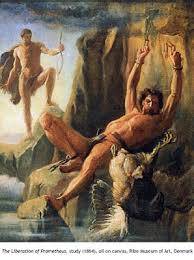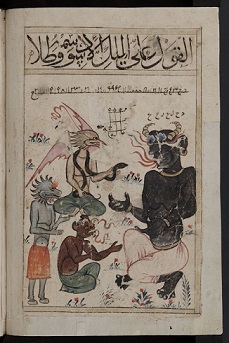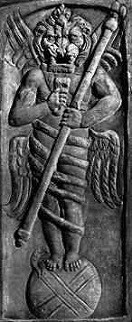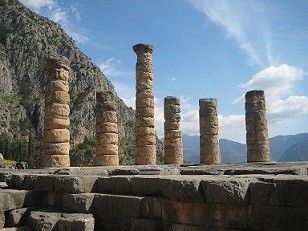Prometheus, the Bringer of Satanic Enlightenment
The legends of Prometheus have been referred to in Satanism because Prometheus represent self-enlightenment. Self-enlightenment is a theme in Satanism, showing how important it is to work on self development.

 Prometheus, the Bringer of Enlightenment
Prometheus, the Bringer of Enlightenment
The legends of Prometheus have been referred to in Satanism because Prometheus represent self-enlightenment. Self-enlightenment is a theme in Satanism, showing how important it is to work on self development. Satanic enlightenment is the process of understanding the self.
The tale of Prometheus can teach us that obstacles can be overcome through self-understanding and perseverance. These mythologies also have a quality that is similar to the legends of Satan rebelling from his position in heaven in order to help humans through understanding and knowledge.
The earliest version of this legend can be found in the mythological writings of Hesiod, who recorded the origins of the Greek gods in his poetry called Theogony. The Theogony is a tale that describes how the gods were created.
Prometheus originated from the Titan god Iapetus, along with the goddess of the sea, Clymene. They had three sons, Menoetius, who was proud, violent and represented mortality, the clever Prometheus, and the foolish Epithemius.
Defiance of the Gods for the Sake of Humans
The story of Prometheus is a tale of a god who defied the other gods for the sake of helping the human race. He fought tirelessly to preserve and motivate humans to be wise and knowing, bringing the knowledge of the gods and progress to the human race.
The origins of Prometheus, like many other legends and mythologies describe humanity through metaphor. The god-father Iapetus was known to the Greeks as the originator of humanity, and his sons embodied human qualities and motivations.
The Fallen Gods
Menoetius represented the dark side of human nature through the qualities of death, war and violence.
Prometheus, who’s name translates as ‘forethought’, represented the intelligence of humans. His other brother Epithemius, whose name means “afterthought”, was the foolish nature of ignorance.
The Father of the gods, Zeus, took notice of Menoetius and his arrogant pride and this outraged him. Fearing that he would be overthrown by the might of Menoetius, Zeus cast a thunderbolt at Menoetius.
Menoetius fell into an abyss, a realm of shadows and darkness, a place named Erebus. The banishment of Menoetius into the dark realms is similar to the Judaeo-Christian tale of the fall of Satan. The prideful and arrogant angel was cast out of heaven, and fell like a bolt of lightning into the pits of hell.
Zeus also had feared that Prometheus was going to trick him, and not wanting to be outwitted by this god of men, he bound Prometheus with chains and hung him upon a shaft. The cruel Zeus then sent an eagle to devour the liver of Prometheus during the day, while his liver would eternally re-generate during the night.
Prometheus is Rescued
 Prometheus suffered until he was delivered from his curse by the warrior, Heracles. In a trade for greater powers, Zeus challenged Heracles to destroy the eagle that had tortured Prometheus. But, feeling sympathy for Prometheus lead Heracles to decide to kill Prometheus instead. When Heracles killed Prometheus it released him from his chains and he was born again. But, Zeus regarded Prometheus with suspicion even though he was proud that Heracles had slain him.
Prometheus suffered until he was delivered from his curse by the warrior, Heracles. In a trade for greater powers, Zeus challenged Heracles to destroy the eagle that had tortured Prometheus. But, feeling sympathy for Prometheus lead Heracles to decide to kill Prometheus instead. When Heracles killed Prometheus it released him from his chains and he was born again. But, Zeus regarded Prometheus with suspicion even though he was proud that Heracles had slain him.
Prometheus came between the gods and men when they were at a dispute, by teaching humans to lay sacrifices before the gods to appease them. Prometheus offered humans the fire and flame that would burn these sacrifices upon the altars of the gods. The people made sacrificial offerings to Zeus and they submitted their will to the gods. By doing this, the mortal men would dine at the sacrificial banquet alongside the immortal gods. Because the whole animal was used in sacrifice, the poor were unable to afford to perform the rite as they needed the food for themselves.
So, Prometheus offered a solution so that the poor could also pay homage to the gods in a respectful way. After pleading to the great god Jove for permission, humans were allowed to sacrifice a portion to the gods and leave some to be eaten in a banquet ritual afterward. The offering of sacrifices to the gods was a way for mortal humans to bond with the immortal gods.
Prometheus as a Mediator between the Mundane and Divine
Being the god of Forethought, Prometheus decided to teach Zeus a lesson. To please Zeus, Prometheus had slain a bull as sacrifice, and presented them to Zeus in two different parts, one of which was only bones and fat disguised as a real sacrifice. Unaware that he was being fooled, Zeus ate the fake sacrifice instead.
Since the sacrifice of bones pleased the other gods, Prometheus had tricked Zeus for the sake of humans, and even for Zeus himself, so that all could carry on the tradition of offering sacrifices to the immortal gods.
“and because of this the tribes of men upon earth burn white bones to the deathless gods upon fragrant altars. “1
The Revenge of Zeus
Zeus was angered by this trickery, and it was not good enough for him that the men no longer offered the whole animal in sacrifice. He set out to get revenge upon Prometheus, once again. Because the humans used fire to burn the sacrifices, Zeus took this fire away from humans. Prometheus was so clever he was able to outwit Zeus again and he recovered the fire from within a hallow fennel stalk, and returned this power to humans once more.
It was this same hallowed fennel stalk that the Greeks had used to kindle the fires of the sacrifices.2 The fire that Prometheus brought to humans is compared to the knowledge of the gods.
The communion and relation with gods was denied to humans but in return they were allowed to keep the fires that burned the sacrifices. Prometheus is the genius and insight, knowledge and motivation that brought humans closer to their divine potential as gods within.
Satanic Enlightenment through the Myths of Prometheus
Through this story we can compare the legends of Satan and Lucifer as beings of Satanic enlightenment. Through understanding these myths we can come closer to understanding the self. The flame of Prometheus is the inner soul that allows us to connect with our own inner divinity. It is through this that we can become as gods, through the process of Satanic enlightenment.
References
1.The Theogony of Hesiod circa 700 BCE Translated by Hugh G. Evelyn-White Dodo Press (October 24, 2008) [accessed 7/4/2017]
2.Greek and Egyptian Mythologies By Yves Bonnefoy, Wendy Doniger University Of Chicago Press; 1 edition (November 15, 1992) [accessed 7/4/2017]
See also Spiritual Satanist Essay: Essay on Apollyon the Destroyer
Or, return to the Satanic Demonology Page



